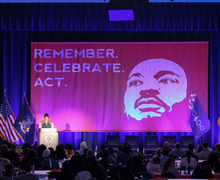Jewish, Muslim students find ‘common ground’ in inaugural fellowship
Cassandra Roshu | Photo Editor
Syracuse University’s Jewish-Muslim Dialogue Fellowship brought 10 Jewish and 10 Muslim students together for weekly interfaith discussions.
Get the latest Syracuse news delivered right to your inbox.
Subscribe to our newsletter here.
When Rabbi Ethan Bair and Imam Amir Durić submitted a grant application to fund Syracuse University’s first Jewish-Muslim Dialogue Fellowship program in June 2023, they could not have predicted how increasingly relevant the conversations would become later that year.
The ongoing Israel-Hamas war has created tension on college campuses across the United States while Islamophobic and antisemitic incidents have drastically increased. JMF, a month-long fellowship, brought 10 Jewish and 10 Muslim students at SU together for weekly interfaith discussions to build “empathy, trust and common ground” amid the conflict, Bair said.
“After October 7, we realized how grateful we were for already planning to do this dialogue fellowship,” Bair said. “It became even more important that we do it.”
The fellowship met over the month of February. Bair, Durić and two student interns facilitated discussions on the shared experiences between Jewish and Muslim students as both are “religious and cultural minorities” on SU’s campus, Bair said.
Bair and Durić said the idea to host a fellowship began when Hillel and MSA hosted several collaborative events in the spring of 2023, such as a CNY Diaper Bank volunteer event and a Community Iftar.
After the events, Muslim students would approach Durić wanting to learn more about Judaism and Jewish students would say the same to Bair about Islam, they said. The two then applied for — and were later awarded — a grant through Interfaith America, a national nonprofit seeking to promote “religious diversity,” according to its website.
Throughout September, Bair and Durić met to plan the fellowship’s topics of discussion. Later that fall, they piloted some of these conversations during a “Taste of Dialogue” interfaith event where attendees compared the tenets of Judaism and Islam through analyzing religious texts.
“We had students who, for the first time, met someone who is Muslim or who is a Jew,” Durić said. “During JMF, the same thing happened — students for the first time engaged with someone who shares this different identity.”
With “Taste of Dialogue” focusing on the two religions’ texts, JMF drew from the personal experiences of its fellows. Each week, the group’s conversations ranged from the similarities between their religious traditions and “Jewishness and Muslimness” on college campuses.
Some discussions, which were primarily student-led, featured guest speakers to help construct a more “nuanced” understanding of the historical relationship between Muslim and Jewish people, Bair said.
Muslim student fellow Rifah Elahi, a freshman in the College of Engineering and Computer Science, said she decided to participate in the fellowship after hearing about it from Avva Boroujerdi, JMF’s Muslim student facilitator. As a devout Muslim and active member of MSA, she was interested in learning about the connections between Islam and Judaism.
“I, personally, am very religious, and I had a lot of fun talking about faith with religious people from other religions,” Elahi said. “I don’t think I had talked this closely with someone from another Abrahamic religion before.”
Elahi enjoyed the “conversational” structure of JMF, which she said often felt more like a social event than a traditional class. Having personal interfaith discussions helped the fellows find “solace” and solidarity with each other, she said
Jewish student fellow Gavi Sela, a sophomore and Hillel’s Shabbat co-chair, said he was surprised to see how the conversations between the Jewish and Muslim fellows evolved.
“We didn’t jump into the hard questions right away. We decided to first gain an understanding of each other,” Sela said. “We had already built an innate understanding and connection between each other before we got down into the nitty gritty, of the conflict especially.”
Bair and Durić said the gradual transition into more complex and emotionally charged topics was by design. Bair said he got the idea after a summer meeting with the associate director of NewGround: A Muslim-Jewish Partnership for Change, an organization dedicated to strengthening Jewish-Muslim relations, according to its website.
Both Bair and Durić said their most prominent memory from JMF was in the program’s third week. After the typical session ended, they noticed students staying behind to discuss the Israel-Hamas war.
“I wanted to do (JMF) because I felt that most of the discussions about the Israeli-Palestinian conflict weren’t going anywhere,” Sela said. “If I got to have personal connections with people, it would be something that was extremely meaningful during these chaotic times.”
Although JMF did not originate from the onset of the Israel-Hamas war, Sela said it made himself and others more well-equipped to discuss the conflict.
After what Bair called a “successful” first semester, Hendricks plans to bring back the fellowship in semesters to come. They also plan to introduce other interfaith and multicultural initiatives which will similarly encourage building connections across marginalized communities on campus, Durić said.
Sela and Elahi said they want to see the program expand because, despite the program’s short duration, they were able to build “lasting connections” with the rest of the fellows. They also said the fellows continue to meet regularly and attend each other’s cultural events — such as Hillel’s Shabbat services and MSA’s Jumuah prayers.
“There were only 20 students, 10 Muslim and 10 Jewish. I was thinking, ‘wow, this is a drop in the bucket,’” Bair said. “Imagine if even more students had these kinds of conversations, how powerful that would be.”
Published on March 27, 2024 at 11:46 pm
Contact Julia: jmboehni@syr.edu






